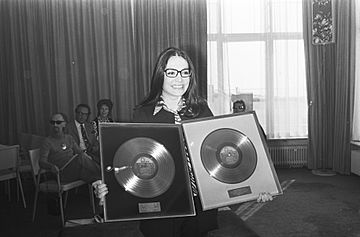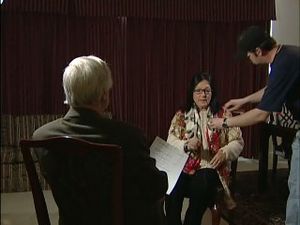Nana Mouskouri facts for kids
Quick facts for kids
Nana Mouskouri
|
|
|---|---|
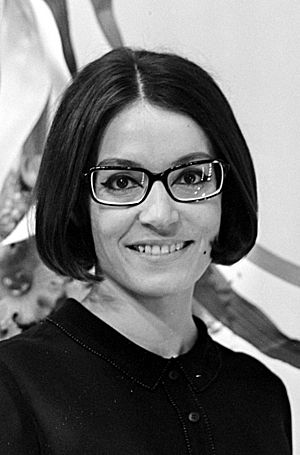
Mouskouri in 1966
|
|
| Background information | |
| Birth name | Ιωάννα Μούσχουρη (Ioánna Moúschouri) |
| Born | 13 October 1934 Chania, Crete, Greece |
| Genres | Jazz, pop, easy listening, folk, Greek folk, world music |
| Occupation(s) | Singer |
| Instruments | Vocals |
| Years active | 1958–2008 2011–present |
| Labels | Fontana, Polydor, Mercury, Verve, Philips, PolyGram, Universal Music France |
| Associated acts | Quincy Jones, Harry Belafonte, Manos Hadjidakis, Mikis Theodorakis, Michel Legrand, Demis Roussos, Julio Iglesias, Mireille Mathieu, Charles Aznavour |
|
Nana Mouskouri
|
|
|---|---|
| Member of the European Parliament for Greece | |
| In office 1994–1999 |
|
| Personal details | |
| Political party | New Democracy (Greece) |
Ioanna "Nana" Mouskouri (born October 13, 1934) is a famous Greek singer. She is known all over the world for her beautiful voice and her signature black-rimmed glasses. Over her long career, she has recorded over 450 albums in more than a dozen languages, including Greek, French, English, and German.
Mouskouri became famous across Europe with her song "The White Rose of Athens." This song was a huge hit and was her first record to sell more than one million copies.
In 1963, she sang for Luxembourg in the Eurovision Song Contest. Later, she recorded the theme song for the movie The Umbrellas of Cherbourg. From 1968 to 1976, she had her own TV show on the BBC called Presenting Nana Mouskouri, which made her an international star.
One of her biggest hits is "Je chante avec toi Liberté" ("I sing with you, Liberty"), which she recorded in 1981. She also sang the popular theme song "Only Love" for the TV series Mistral's Daughter in 1984.
Besides singing, Mouskouri has also worked to help others. In 1993, she became a spokesperson for UNICEF, an organization that helps children around the world. From 1994 to 1999, she was a member of the European Parliament, representing her home country of Greece.
Contents
Early Life and Music
Nana Mouskouri was born on October 13, 1934, in Chania, a city on the Greek island of Crete. Her father worked as a movie projectionist, and her mother was an usher in the same movie theater. When Nana was three, her family moved to Athens, the capital of Greece.
A Special Voice
Nana and her older sister, Jenny, both went to the Athens Conservatoire, a famous music school. At first, Jenny seemed to be the more talented singer. But their teacher said that while Jenny had a better voice, Nana had a true passion for singing.
A medical check-up showed that Nana has only one working vocal cord. This might be why her singing voice is so unique and special, different from her softer speaking voice.
During her childhood, Greece was occupied by Nazi Germany during World War II. Her father was part of the resistance movement against the Nazis. Nana started taking singing lessons when she was 12. She loved listening to famous singers like Frank Sinatra, Ella Fitzgerald, and Édith Piaf.
Starting Her Career
After eight years of studying classical music and opera, Nana's friends encouraged her to try jazz. She started singing in a jazz group at night. When her professor at the music school found out, he was not happy. He believed jazz was not serious music and stopped her from taking her final exams.
So, Nana left the school and began performing in clubs in Athens. In 1958, she met the Greek composer Manos Hadjidakis, who was very impressed with her voice. He wrote songs for her, and in 1959, she won first prize at the Greek Song Festival. This was the start of her amazing career.
In 1961, her German song "Weiße Rosen aus Athen" ("White Roses of Athens") became a massive hit. It sold over a million copies in Germany and was translated into many languages, becoming one of her most famous songs.
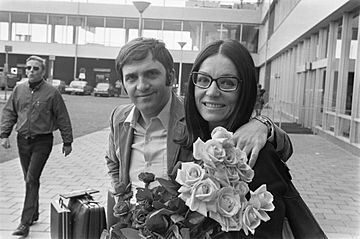
Becoming an International Star
In 1960, Mouskouri moved to Paris, France. She quickly became a star there. In 1962, the famous American musician Quincy Jones asked her to come to New York City to record a jazz album.
Touring with Harry Belafonte
American singer Harry Belafonte heard her album and loved it. He invited Mouskouri to tour with him in 1966. At first, Belafonte suggested she take off her glasses on stage. Mouskouri was so unhappy about this that she almost quit. Belafonte respected her feelings and let her perform with her glasses on. Her glasses became a famous part of her look.
Television Success
In 1968, the BBC in the United Kingdom gave Mouskouri her own TV show, Presenting Nana Mouskouri. The show was very popular and ran for many years. She sang in different languages and had guest stars from all over the world. This show helped make her a household name in many countries.
She also had hit albums in the U.K., France, and Germany during the 1970s. Her music became popular as far away as Australia, Japan, and Taiwan.
Later Career and Other Work
Throughout the 1980s and 1990s, Mouskouri continued to record hit songs and tour the world. In 1981, her song "Je chante avec toi Liberté" was a worldwide success. In 1985, her song "Only Love" became a number 2 hit in the U.K.
Working for a Better World
In 1993, Mouskouri became a Goodwill Ambassador for UNICEF. She traveled to places like Bosnia to bring attention to the needs of children affected by war.
From 1994 to 1999, she served as a Member of the European Parliament. This is a group of leaders from different European countries who make laws together. She represented her home country, Greece. She later resigned because she felt she was not suited for the daily work of a politician.
Life in the 21st Century
Mouskouri lives in Switzerland. In 2004, a special box set with over 600 of her songs was released in France.
From 2005 to 2008, she went on a farewell concert tour around the world. Her final concerts were held in Athens, Greece, at the ancient Herodes Atticus Theatre.
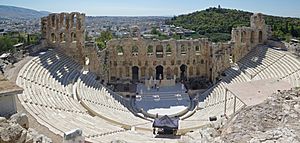
Even after her "farewell" tour, Mouskouri has continued to perform. She did a concert tour in Germany in 2012. For her 80th birthday, she began a "Happy Birthday Tour" that lasted three years. In 2018, she went on another tour called the "Forever Young Tour."
In 2024, at the age of 89, she performed the French and Greek national anthems at the Olympic Handover ceremony in Athens. This was when Greece passed the Olympic flame to the hosts of the 2024 Summer Olympics.
In 2025, her German song "Guten Morgen, Sonnenschein" became a viral hit on TikTok and Spotify after being used in the Netflix series Cassandra.
Family Life
Mouskouri has been married twice. She first married Yorgos Petsilas, a guitarist in her band. They had two children, Nicolas (born in 1968) and Hélène (born in 1970). They later divorced.
She later married her record producer, André Chapelle, in 2003. They live together in Switzerland.
See also
 In Spanish: Nana Mouskouri para niños
In Spanish: Nana Mouskouri para niños
 | Anna J. Cooper |
 | Mary McLeod Bethune |
 | Lillie Mae Bradford |


